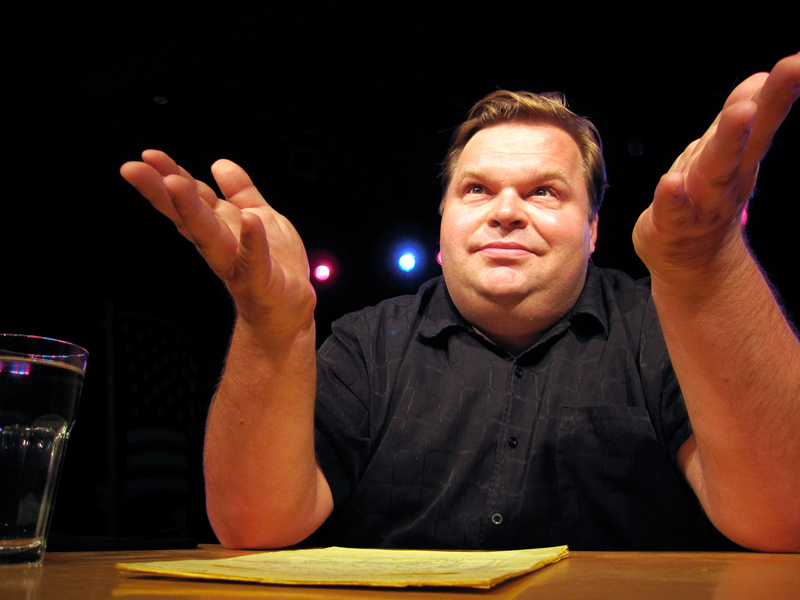
Familiarity, so the saying goes, breeds contempt.
Ray Dooley begs to differ.
In the world of theater, Dooley believes, familiarity with other people on the stage instills the confidence needed to take risks. Familiarity can be the safety net that allows an actor to inhabit an imaginary role so completely that, in that moment, the imaginary seems real.
That kind of familiarity is exactly what Dooley and Julie Fishell drew upon when playing George and Martha in the play “Who’s Afraid of Virginia Woolf?” for PlayMakers Repertory Company in 2011.
The intense emotional drama, written in 1962 by Edward Albee, examines the breakdown of the marriage of a middle-aged couple following a university faculty party. George is an associate professor of history; Martha, the daughter of the president of the college where George works.
“George and Martha had been married, I believe, for 22 years,” Dooley said. “At the time we played them, Julie and I had been working together at PlayMakers for 18, and those years together gave us an instinctual familiarity with each other that you cannot manufacture in a three-week rehearsal.
“We were just comfortable sitting on a couch together and talking to each other.”
Finding the magic
Joe Haj, PlayMakers producing artistic director who cast the pair, believes PlayMakers is one of the best resident theater companies in the country because it has members like Dooley and Fishell who have worked together so long and know each other so well.
Rehearsal rooms often move at the pace and level of the most talented actor in the room, Haj said, and “when that person is Ray Dooley, it makes the room better.”
PlayMakers has seven permanent members drawn from the Carolina faculty who anchor each production. At any point in time, the company also includes 12 to 16 graduate students along with a handful of guest artists including actors, designers and directors.
McKay Coble, assistant chair of the Department of Dramatic Art who designs sets and costumes for the stage, said Dooley joined the faculty right after she did in the late 1980s. Although the faculty members of the company are all about the same age, Dooley rises to the level of a father figure who leads by example, she said.
“I don’t know if I would say Ray is the hardest worker among us, but he is probably the most holistic worker in that he is as close to being a director as an actor can get,” Coble said. “He inhabits his roles in an informed way.”
One definition of talent is the ability to inhabit an imaginary world with full personal conviction, Dooley said. After all the preparation, all the research, “you have to tune in to what’s happening right in front of you in the moment,” he said.
“The best kind of acting – the acting that we all aspire to – is that alchemy between preparation of the world you are inhabiting with absolute spontaneity. It is not showing emotion, it is re-experiencing emotion from my life in the moment on stage, within another context.
“The people in the audience are seeing context, they are seeing a set design, they are seeing a world, so the audience will do the work of translating the personal behavior into the behavior within the world of the play.
“That’s the magic that happens with theater.”
Passing down the craft
Dooley also embraces working with young actors, both on the stage as a colleague and in the classroom as a teacher.
Styles may come and go, but the fundamentals of the craft really have not changed much through the centuries, Dooley said. “The way you got the laugh with the Shakespeare line in 1598 is pretty much the same way as you get the laugh with that same line now,” he said.
Then there is the relationship with the audience.
“They are the reason behind the hard work, and all of my colleagues feel the same way,” Dooley said. “We feel a responsibility to the people who come to see us.”
Something Bruce Springsteen was quoted as saying resonates with Dooley: that when someone buys a ticket to see him perform, it is no different from standing there and shaking the person’s hand.
“And as with Springsteen, there is a compact made when people come to a show that they are going to get our best every time,” Dooley adds.
The University recognized Dooley’s steadfast commitment to his community and his craft by naming him one of six recipients of a 2014 C. Knox Massey Distinguished Service Award.
An ‘artistic home’
Born and raised in Mineola, New York, a Long Island suburb, Dooley was as active on the ball field as he was on the stage. Maybe that is why he still sees one part of acting as a competitive sport.
“When you go in for an audition, there can be 20 other guys who sort of look like you,” Dooley said. “You can pretty much figure 15 of them aren’t very good, but the five other guys have what it takes to beat you out of the part. Winning a part is a matter of arriving prepared and peaking at the right moment.”
At Hamilton College in Clinton, New York, Dooley graduated Phi Beta Kappa with a double major in English and theater, then received a master of fine arts degree from the American Conservatory Theatre in San Francisco.
By then, Dooley had begun to appreciate not just the competition of acting, but the teamwork it demands as well.
“Probably, deep down, I knew I wanted to engage as an actor because of the physical component it requires, the social component that it requires and the company it gives you – the feeling of working with the team to create something,” Dooley said.
“That has always been extraordinarily important to me. I am always happiest when I’m working with people I respect and love.”
And it is why, for the past 26 years, he has been so happy to be here.
For Dooley and other resident members of the company who have been around almost as long as he has, Chapel Hill is their “artistic home.” The term, Dooley said, comes from a book written several decades ago that became a manifesto on the notion that artists flourish best when they find a home in which to work and live.
“That has certainly been true for me in Chapel Hill,” he said.



